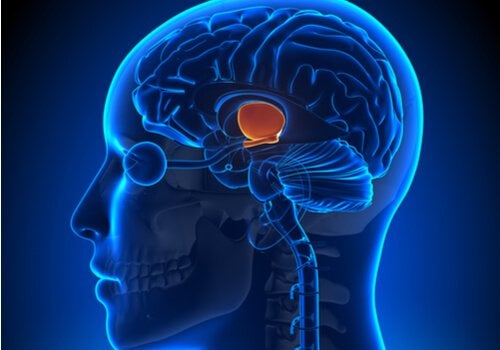Do you know what the hypothalamus does? It is an area of the center of the brain that, however small, is of great importance, a strong point is that it plays an important role in the production of hormones, in addition, it helps to stimulate many important processes in the body.
In addition, when the hypothalamus does not work properly, it can cause organic problems that cause many disorders. On the other hand, although hypothalamus diseases are rare, it is important to always keep it healthy to reduce the risk.
- The word hypothalamus comes from two Greek words that translate as “under the thalamus”.
- This is where the hypothalamus is located.
- Under the thalamus and above the pituitary gland.
- We are talking about a small area of the brain.
- Which is not a reason not to play an important role in the body by influencing both the endocrine system and the nervous system.
The state of organic balance is called homeostasis. The body always tries to achieve/improve this balance, so the main function of the hypothalamus is to regulate different conditions to achieve it.
To do this, the hypothalamus acts as a connector between the endocrine and nervous systems, in fact, it plays an important role in many of the essential functions of the body, such as the regulation of body temperature, thirst and appetite.
It also interferes with the regulation of emotions, sleep cycles, childbirth, blood pressure and heart rate, as well as the production of digestive fluids and the balance of bodily fluids, as well as chemicals that generate anger, sadness, passion, sexual satisfaction among others, are considered to form in the hypothalamus.
When signals are sent to the brain from different areas of the body, the hypothalamus responds by releasing the right hormones into the bloodstream to balance the body.
To maintain this balance, the hypothalamus is primarily responsible for the functioning of the endocrine system, in addition to being strictly related to the pituitary gland, which produces and sends important hormones.
Therefore, the hypothalamus and pituitary gland work together to control the entire endocrine system, so it is the glands that produce many hormones in the body, including the adrenal glands, kidneys and thyroid gland.
Hormones secreted by the hypothalamus include
Any disorder that prevents the hypothalamus from functioning properly is called hypothalamic dysfunction. Hypothalamic dysfunctions are very difficult to count because their number is very large.
The hypothalamus also plays a role in releasing hormones from the pituitary gland to the rest of the endocrine system.
Because it is very difficult to diagnose which specific gland is not working properly, these disorders are often called hypothalamus-pituitary glands In these cases, there is evidence that evaluates the functioning of the endocrine system and gives advice on how to identify the root of the disorder.
The most common causes of hypothalamic dysfunction are head injuries that affect the hypothalamus; surgery can affect the hypothalamus, as well as radiation and tumors; in some cases, there may also be a genetic link to hypothalamic disease.
Additional causes of hypothalamic dysfunction may include
Since the hypothalamus plays such a vital role in the body, it is essential to take care of it and stay healthy. Although genetic factors cannot be avoided, certain dietary steps contribute to better functioning.
The hypothalamus controls appetite and is in fact affected by food consumed. Research has shown that diets rich in saturated fats can impair the function of the hypothalamus, which regulates hunger and energy expenditure.
It has also been discovered that diets rich in saturated fats have an inflammatory effect on the body, which can affect the immune system, increasing the chances of it rising against healthy cells in the body, increasing inflammation in the gut and impairing the body’s natural functioning. .
Diets rich in polyunsaturated fats, such as omega-3 fatty acids, can help reverse/mitigate this inflammation. These fats can be a safe alternative to other types of oils and fats. Foods rich in omega-3 include fish, nuts, flaxseeds and green leafy vegetables.
In this sense, to promote the health of the hypothalamus and improve brain function, it is important to consume fruits and vegetables rich in vitamins, especially vitamins C and B.
It should be noted that the hypothalamus is one of the most important parts of the body, however, as soon as we notice its presence until it starts to malfunction, taking care of your food can help you keep it in good condition, so we can prevent many diseases.

